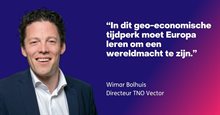Guidance for collaboration orchestration
TNO has spent the last years developing a new methodology to orchestrate innovations, aptly named Acceleration Compass. It serves as a guideline for orchestrators to comprehend the collaborative challenges and establish a fit-for-purpose orchestration process that aligns all stakeholders' views, goals, and interests. Innovation cycles can thus be cut down by years and the solutions can be scaled – or failed – much sooner.
The struggle to discriminate innovation problems
Innovation orchestrators have the weighty task of bringing sometimes hundreds of people from government, businesses, academic institutes and the public together on an innovation programme, and to ensure each stakeholder understands the common goal from every angle. The struggle for many orchestrators is uniformly classifying the circumstances, and thus knowing which orchestration approach to adopt.
The compass methodology of TNO focuses on three aspects:
- Determine the key factors that make an innovation ecosystem thrive or die.
- Know the reasons for choosing a specific innovation approach to set up a collaboration.
- Ensure that all participants are on the same page at the start of a collaboration.
There are two main factors that help maintain a collaboration over time:
- The first is an ecosystem’s goal specificity. Climate-neutrality, for instance, may have one generally accepted definition, but often has divergent meanings and implications for individual stakeholders. How do we clarify the common goal within a collaboration?
- The second factor concerns interdependency. In other words, do we know precisely why we collaborate with a particular person within a particular organisation?
Concretise the need to foster collaboration
TNO’s compass methodology helps orchestrators concretise the above questions in order to decide which collaborative approach works best. To achieve this, innovation technologies are divided into three main categories:
- Early stage technology; often a technology push that calls for a stage-gate model approach.
- Advanced, socially embedded technology; a participative, user-centred and co-creative path.
- Technology with unknown cause and effect relationships; this requires a systems innovation approach to analyse the system and identify leverage points.
Correctly categorizing an innovation expedites its implementation, amplifies its positive impact, and mitigates negative impacts on society and businesses.
TNO as innovation orchestrator
One way TNO is testing the effectiveness of the compass methodology is through cognitive studies. One such study is a quantitative concrete choice experiment in cooperation with cognitive psychologists from the University of Groningen.
Participants from three distinct groups – experienced orchestrators, internal orchestrating innovation course attendees with limited experience, and external students with no practical orchestration experience – were asked to classify problems using the compass approach, both before and after attending a carefully designed lecture on the subject.
Whereas 29% managed to classify innovation challenges correctly before the lecture, 56% succeeded afterwards. While further data is required, the initial findings are certainly encouraging.
Ensuring that all the partners know what their stake is within a collaboration, understand each other’s mutual reliance, and work towards the same goal, is no easy feat.
TNO is at the vanguard of collaborative innovation and has been the linchpin of countless game-changing technologies. Since last year, around 150 innovators have completed the Acceleration Compass Methodology course and now apply the learnings in the field –which TNO is monitoring forward.
Although it is still early days and research is ongoing, the results so far show that innovators can apply the compass approach, even before the innovation process starts, to accelerate innovation scale up and to understand the potential impact on society sooner.




